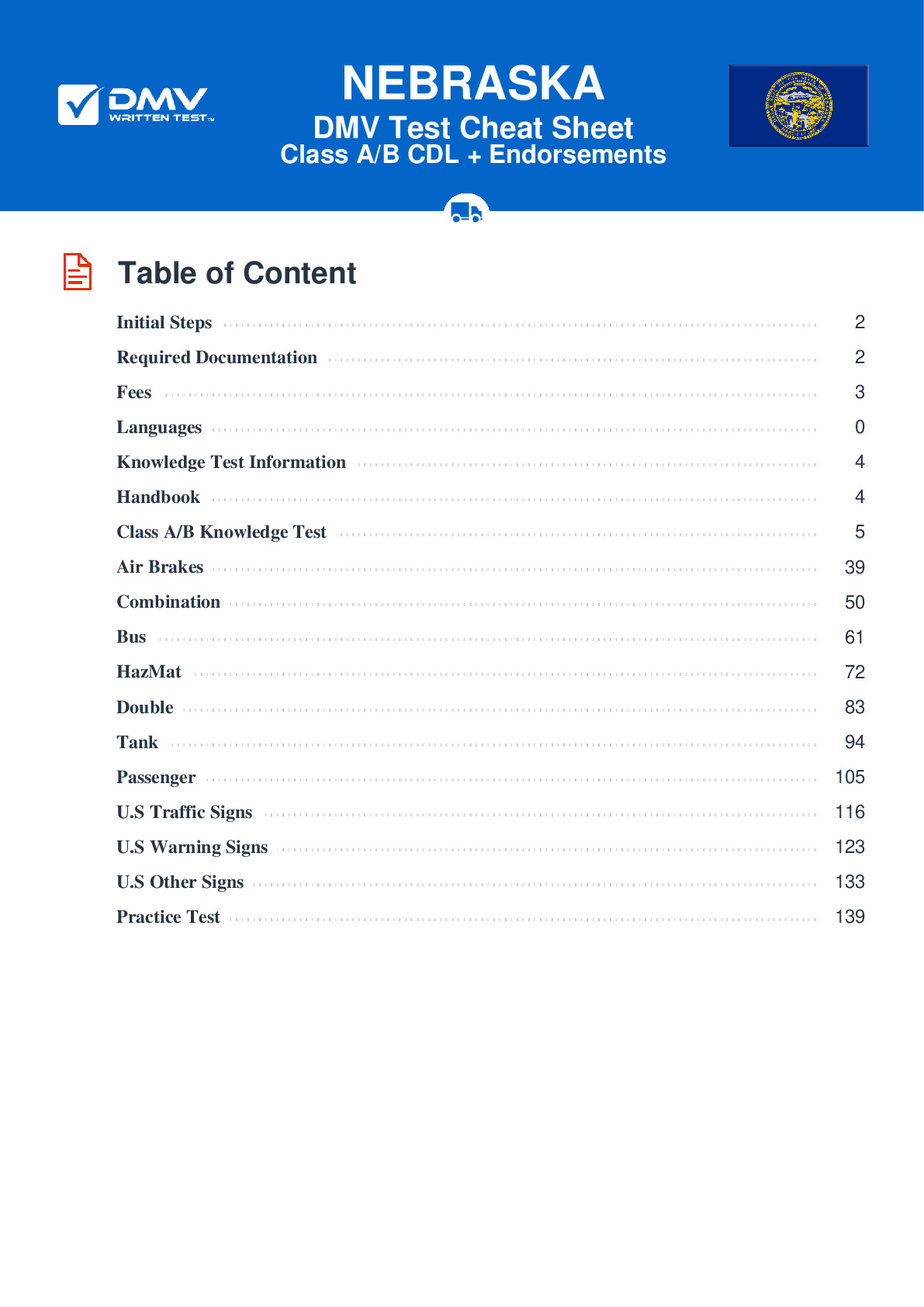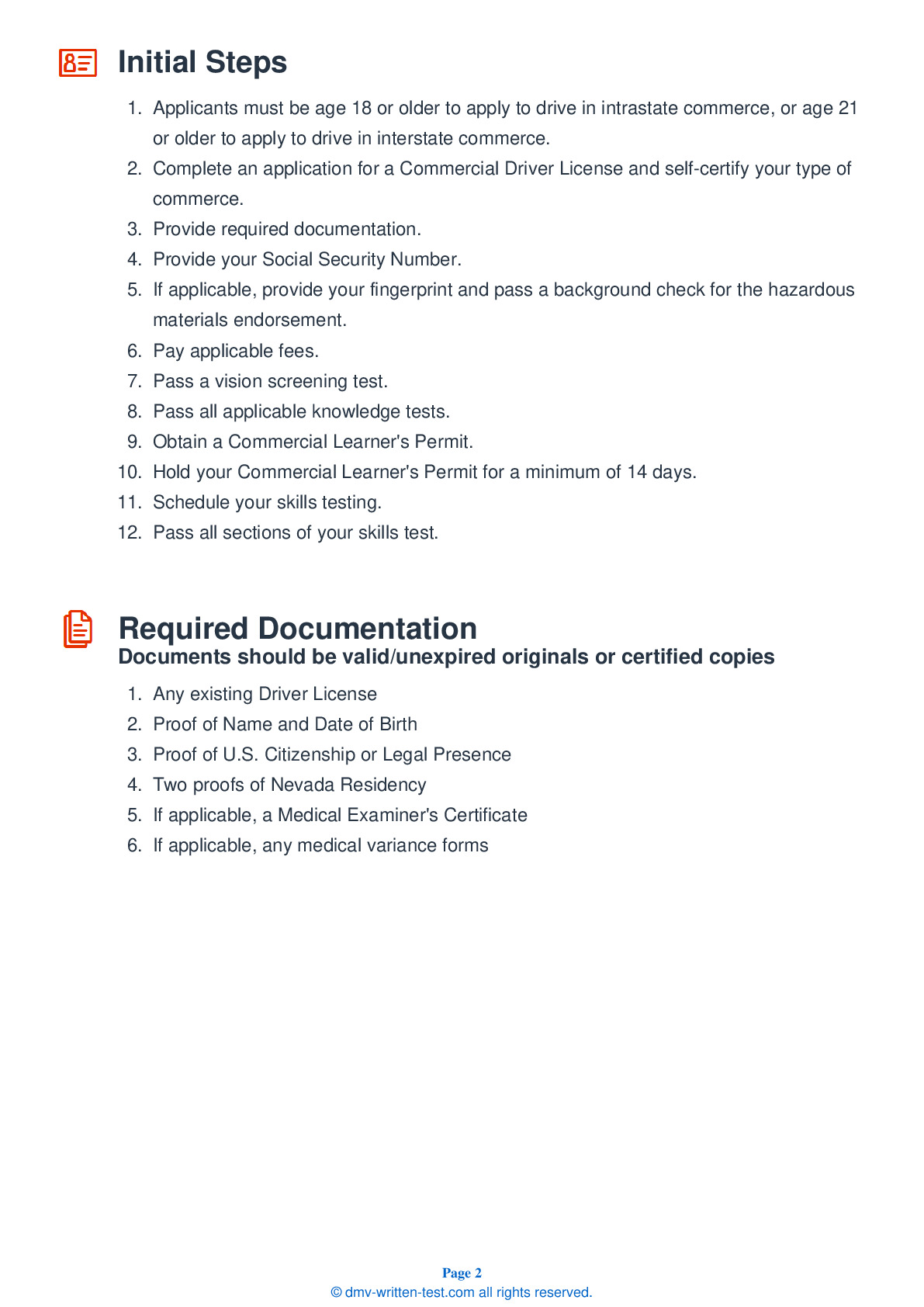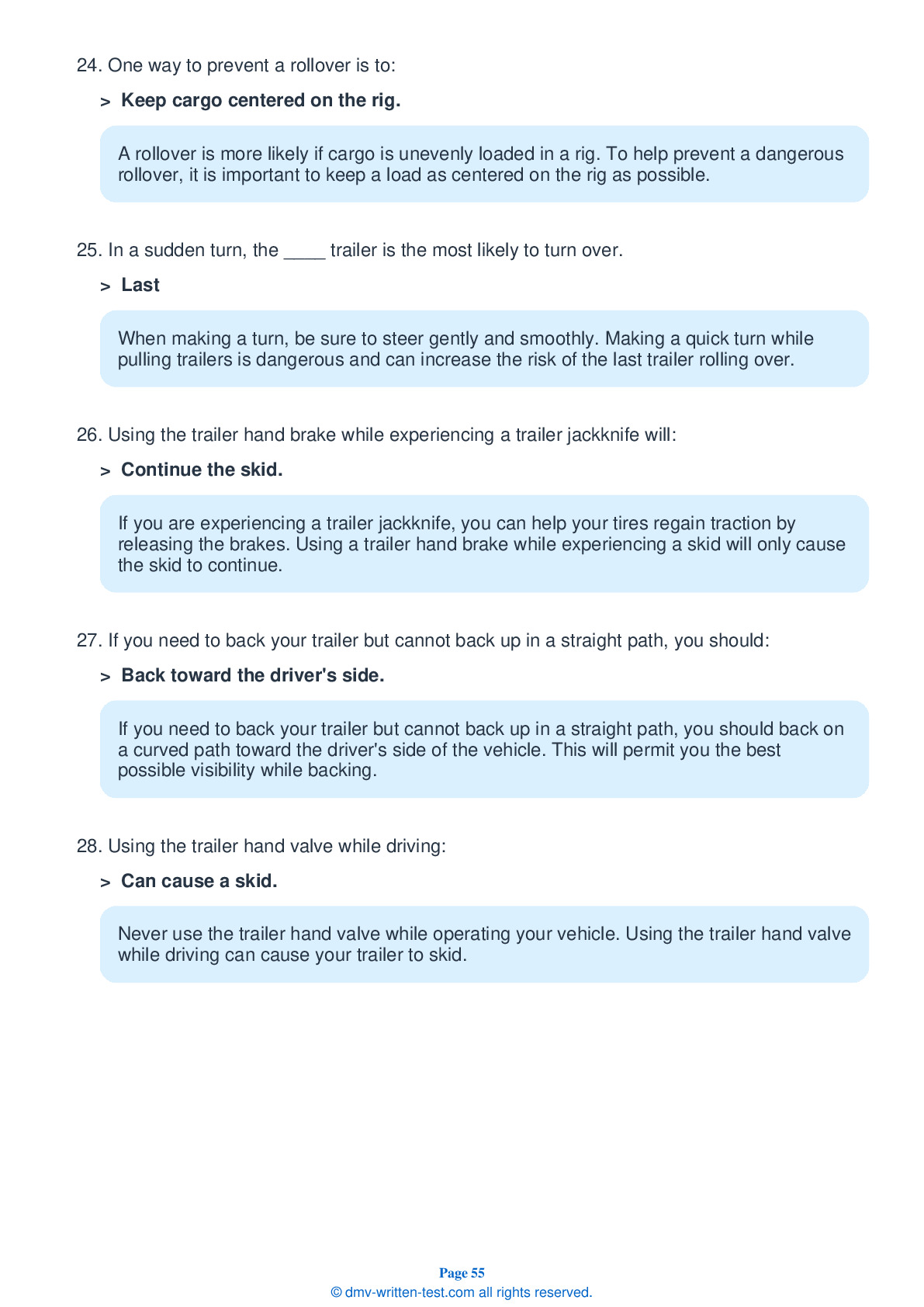Knowledge Test Class A
This license is required for driving any legal combination of vehicles, with a gross combination weight rating of 26,001 pounds or more, provided the GVWR of a trailer exceeds 10,000 pounds To receive this license, applicants must pass a 50-question test. To pass, applicants must answer 40 questions correctly. Each question has two, three or four possible answer choices. Test questions come from the Nebraska Commercial Driver License Manual. Questions come from chapters covering: Introduction, Driving Safely, Transporting Cargo Safely, Air Brakes (if applicable), Combination, Doubles and Hazardous Materials. Endorsements that may be used with a Class A CDL are: Hazardous materials, Tank, Passenger, HazMat and Tank, Air Brakes and School bus.
8. When driving at night, you should do all of the following, except:
To ensure that you can see as well as possible, don't wear sunglasses when driving at night. If you wear eyeglasses, make sure they are clean and unscratched. Make sure you are rested and alert before driving at night.
9. If air pressure drops to a level between ____, a visual low pressure warning signal should have already activated.
A visual low pressure warning signal should activate before air pressure drops to a level between 55 and 75 psi. This signal could be a light, a buzzer, or a wig wag.
10. Extremely hot temperatures can cause:
Because air expands when hot, tire pressure increases as temperatures increase. This can sometimes result in tire failure. Consistently check your tire pressure when making a trip in hot weather.
11. If driving in extremely hot weather and the air pressure in your tires is too high, you should:
Air expands as it gets warmer, so the air pressure in your tires could reach dangerously high levels while being driven in very hot weather. If this happens, stop and let your tires cool. Do not let air out of the tires, as this could result in the pressure dropping to an unsafe level once they cool down.
12. How many daily hours of sleep does an adult need to maintain alertness?
Being properly rested is essential to the safe operation of a CMV. To maintain alertness, most people need eight to nine hours of sleep per night.
13. Roads are especially slippery when it first begins to rain because:
Roads are particularly slippery when it first begins to rain. The water mixes with oil drippings on the road that have not yet washed away, creating a slippery and dangerous mixture.
14. Roads are especially slippery right after it begins to rain because:
Roads are often especially slippery when it first begins to rain. Rainwater forms a slick film when mixed with oil and grease on the road surface that has not yet washed away.
Frequently Asked Questions
Here are the steps to obtain a Class A CDL license in Nebraska:
1. Obtain a Nebraska Commercial Learner's Permit (CLP) by passing the written knowledge test for the Class A CDL. You must be at least 18 years old to obtain a CLP.
2. Hold the CLP for at least 14 days before taking the skills test.
3. Schedule and pass a pre-trip inspection, basic control skills, and road test at a Nebraska DMV-approved testing location.
4. Pay the fee for your Class A CDL license.
5. If you plan to operate a vehicle transporting hazardous materials or passengers, you must also pass additional tests and obtain endorsements on your CDL.
6. Maintain your CDL by meeting all state and federal requirements, such as completing regular medical exams and complying with safety regulations.
1. Tractor-trailers: This is the most common type of vehicle that Class A CDL drivers operate. Tractor-trailers consist of a tractor unit (the cab) that pulls one or more trailers.
2. Tanker trucks: Tanker trucks are used to transport liquids or gases, such as fuel, oil, or chemicals.
3. Flatbeds: Flatbed trucks have an open cargo area that is flat and level. They are often used to transport large items like machinery or construction equipment.
4. Livestock carriers: Livestock carriers are used to transport animals such as cattle, horses, and pigs.
5. Other large commercial vehicles: Class A CDL drivers may also operate other types of commercial vehicles, such as dump trucks, garbage trucks, and buses (with appropriate endorsements).
It is important to note that specific endorsements and additional training may be required to operate certain types of vehicles.
1. Be at least 18 years old: You must be at least 18 years old to obtain a Class A CDL in Nebraska. However, if you plan to drive across state lines or transport hazardous materials, you must be at least 21 years old.
2. Have a valid driver's license: You must have a valid driver's license in the state of Nebraska.
3. Obtain a Commercial Learner's Permit (CLP): You must pass the written knowledge test for the Class A CDL and obtain a CLP before you can take the skills test.
4. Hold the CLP for at least 14 days: You must hold the CLP for at least 14 days before taking the skills test.
5. Pass the skills test: The skills test consists of a pre-trip vehicle inspection, basic control skills, and a road test.
6. Meet medical requirements: You must meet certain medical requirements to obtain and maintain your CDL, such as passing a Department of Transportation (DOT) physical examination.
7. Pay the fees: There are fees associated with obtaining a Class A CDL in Nebraska.
8. Additional endorsements: If you plan to transport hazardous materials or passengers, you must pass additional tests and obtain endorsements on your CDL.
It is important to note that there may be additional requirements depending on your specific situation or type of commercial vehicle you plan to operate.
If a driver wants to drive across state lines or transport hazardous materials, he or she must be at least 21 years old to obtain a Class A CDL. Additionally, some commercial carriers may have their own age requirements for drivers, which may be higher than the state minimum.
The most common endorsements for a Class A CDL are:
1. Hazmat (H): This endorsement is required if you plan to transport hazardous materials.
2. Tanker (T): This endorsement is required if you plan to operate a vehicle that carries liquid or gas in bulk.
3. Doubles/Triples (T): This endorsement is required if you plan to operate a vehicle that has two or three trailers attached.
4. Passenger (P): This endorsement is required if you plan to transport passengers, such as a bus or a van.
To obtain an endorsement, you must pass a written test that covers the knowledge and skills required for the specific type of cargo or vehicle. You must also meet any additional requirements, such as holding a valid medical certificate or passing a background check.
It's important to note that some endorsements may require additional fees and periodic renewals, so be sure to check with your local DMV office for more information.
1. Pre-trip inspection: The pre-trip inspection is a thorough inspection of your vehicle to ensure that it's safe to operate. You'll be asked to identify and explain the function of various parts and systems, such as the brakes, steering, suspension, and lights. You'll also be asked to demonstrate how to check fluid levels and tire pressure.
2. Driving test: The driving test consists of three parts: basic vehicle control, on-road driving, and a backing maneuver. During basic vehicle control, you'll be asked to perform maneuvers such as straight-line backing, offset backing, and parallel parking. During on-road driving, you'll be asked to demonstrate your ability to safely drive on the road, including starting and stopping, turning, merging, and changing lanes. During the backing maneuver, you'll be asked to back up your vehicle into a specific area.
During the skills test, you'll be evaluated on your ability to operate the vehicle safely and effectively. You must pass both parts of the skills test in order to obtain your Class A CDL. It's important to practice and prepare for the skills test ahead of time so that you're confident and ready on test day.
1. Air brakes: If you took your skills test in a vehicle without air brakes, you'll have a restriction on your license that prohibits you from operating a vehicle with air brakes.
2. Automatic transmission: If you took your skills test in a vehicle with an automatic transmission, you'll have a restriction on your license that prohibits you from operating a vehicle with a manual transmission.
3. Intrastate-only: If you only plan to drive within the state of Nebraska, you may have a restriction on your license that limits you to intrastate-only driving.
4. Medical: If you have a medical condition that requires monitoring or treatment, you may have a restriction on your license that requires you to carry and submit medical documentation.
5. Hazmat: If you don't have a hazmat endorsement on your license, you'll be restricted from transporting hazardous materials.
It's important to be aware of any restrictions or limitations on your license and to comply with them at all times. Violating these restrictions can result in fines, penalties, and even suspension or revocation of your CDL license.
If you prefer to take the test in a language other than English, you'll need to indicate this when you apply for your CDL learner's permit. You'll also need to provide a translator or have someone with you who can translate the questions and answers for you.
It's important to note that while the written test may be available in multiple languages, the skills test is only available in English. You'll need to demonstrate your ability to communicate in English during the skills test and during any interactions with law enforcement or other officials while operating your commercial vehicle.
To request accommodations for the Class A CDL written test, you'll need to complete and submit a Request for Accommodation form to the Nebraska DMV. The form requires documentation from a qualified medical professional that describes your disability and explains how it affects your ability to take the test.
Examples of accommodations that may be provided include extra time to take the test, a separate testing room, assistance from a reader or scribe, or modified test materials.
It's important to note that requests for accommodations must be submitted in advance of your scheduled test date in order to be considered. The Nebraska DMV recommends submitting your request at least 30 days prior to your scheduled test date.
In Nebraska, you are allowed two attempts to pass the written test for each endorsement. If you fail the test twice, you will need to wait at least seven days before you can take the test again. If you fail the test three times, you will need to wait at least 30 days before retaking it.
There is no limit to the number of times you can take the written test, but keep in mind that there is a fee for each attempt. Additionally, if you fail the test three times for a particular endorsement, you may be required to complete additional training before retaking the test.
It's important to prepare thoroughly for the written test by studying the Nebraska Commercial Driver's License Manual and taking practice tests. This will increase your chances of passing on your first attempt and minimize the need for multiple retakes.




